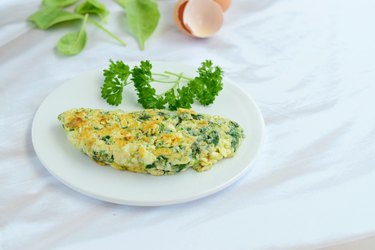
Egg white nutrition data indicates egg whites may be a less fattening, albeit less nutrient-packed alternative to the whole egg. Incorporate egg whites into your diet with healthy recipes for any hour of the day.
Tip
There are approximately 17 calories in one hard boiled egg white.
Video of the Day
Egg White Calories
If you're vying for a less fattening more cholesterol-friendly alternative to the entire egg, try cooking up some egg whites. Though they lack some of the essential nutrients in egg yolks, they do contain high-quality protein and fewer calories.
Video of the Day
According to The University of North Carolina at Chapel Hill, one hard boiled egg white has 17 calories and .2 grams of fat. In comparison, whole eggs contain about 78 calories each, says the American Heart Association. Egg white protein amounts to 3.6 grams per egg, while a full egg contains 6 to 7 grams of protein.
Not only can you rely on egg whites as a protein source and calorie-saver, you can also count on it being not so bad for your cholesterol levels. According to the Harvard School of Public Health, those experiencing issues controlling their LDL cholesterol, may want to be cautious about their egg consumption, and try to choose foods made only with the egg whites.
Egg White vs. Egg Yolk
The Egg Nutrition Center provides a summary of egg white benefits: a protein-rich makeup, riboflavin and selenium. While riboflavin (B2) is essential to energy production and cellular function, growth and development, selenium is responsible for thyroid hormone metabolism, DNA synthesis and protection from oxidative damage.
Egg yolks, on the other hand, contain the bulk of nutrients, such as vitamin D, important for bone health, choline, critical for normal cell functioning and brain development, lutein and zeaxanthin, antioxidants thought to reduce the risk of cataracts and slow the advancement of macular degeneration, the leading cause of blindness in those over 55.
According to the University of North Carolina at Chapel Hill, yolks are also a source of vitamin B12 and iron. The white part contains most of the egg's protein, magnesium, potassium, riboflavin and niacin, says Better Health Channel. But vitamins A, D, E and essential fatty acids are in the yolk.
Despite their health benefits, egg yolks are the primary source of fat and cholesterol. A typical large egg contains 186 mg of cholesterol, says American Heart Association. That said, if your diet doesn't consist of other cholesterol sources, eggs are not necessarily a harmful choice. Keeping your egg intake to one egg per day, or two egg whites per day is recommended.
Egg White Recipes
If you're looking to shed pounds and maintain your heart health, The University of North Carolina Chapel Hill recommends mixing two egg whites with one whole egg. This will provide you with the flavor and nutritional value of the yolk, with half the calories, cholesterol and fat of eating two entire eggs.
You can also make a healthy and nutritious egg white omelet served with any number of vegetables, such as spinach and mushrooms. You can make frittatas and muffins, and several desserts. Merengue, for example, is composed of egg whites and can be eaten on its own or atop different types of fruit.
Healthy Women recommends an egg white omelet with four egg whites, 1 Tablespoon of curry powder, 1 Tablespoon of chopped chives, 1 tablespoon of mustard and salt and pepper to taste. Put all the ingredients in a bowl and mix, then cook the mixture on medium heat and serve.
- Egg Nutrition Center: "Nutrients in Eggs"
- The University of North Carolina at Chapel Hill: "Egg White or Whole Egg?"
- Better Health Channel: "Eggs"
- Harvard School of Public Health: "Eggs"
- The American Heart Association: "Are Eggs Good for You or Not?"
- NIH: "Riboflavin"
- NIH: "Selenium"
- Healthy Women: "Egg-White Omelet"
- Search the USDA National Nutrient Database for Standard Reference